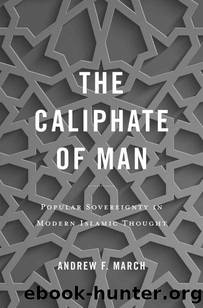The Caliphate of Man by Andrew F. March

Author:Andrew F. March [March, Andrew F.]
Language: eng
Format: epub
ISBN: 9780674987838
Publisher: Harvard University Press
Published: 2019-09-16T18:30:00+00:00
6
A Sovereign Umma and a Living Sharīʿa
I ended the Chapter 1 of this book by synthesizing a number of different literatures in Islamic constitutional and democratic theory. These included scholarly monographs on Islamic constitutional jurisprudence (fiqh dustÅ«rÄ«) or âthe principles of governmentâ (uṣūl al-ḥukm) in Islam, treatises written by Islamist public intellectuals or independent intellectuals sympathetic to political Islam, and some of the texts issued officially by Islamist groups. My claim there was that, for all their differences of style, motivation, and emphasis, there are some points of general consensus that together form a kind of plateau on which modern Islamic constitutional debates are conducted.
These points of general consensus include the view that the people is, broadly-speaking, the source or origin of the legitimacy of political institutions (maá¹£dar al-suluá¹Ät), can elect and supervise political officers, and can participate in various forms of consultation and lawmaking. Similarly, it is broadly agreed that elected rulers are agents or civil servants subject to the law and limited in their authority. Moreover, although elected representatives and state officials have broad powers of legislation and policy making, what makes a political order Islamic is that all laws and enactments must be subject to sharÄ«Ê¿a review of some kind. This is what is meant when some contemporary Islamic constitutional theorists claim that the state in Islam is neither theocratic nor fully secular, but rather a âcivil stateâ with an Islamic referent.
That some of these views require arguing for and defending should be clearer now after the subsequent chapters. The classical tradition of Islamic governance largely assumed a condominium of authority between rulers and scholars, both of whom together and separately the people were said to have a religious obligation to obey. Rulers and scholars overlapped in their authority, but can be said to have represented a different face of Islamic legal normativity. Where the scholars speak for revelation and the history of its interpretation, rulers and other public officials speak for what the public interest requires in any given moment. If these two authorities are accountable to any authority besides each other, it is to an ill-defined body of elite representatives of the community, known generically as the People Who Loose and Bind. Importantly, not only do all of these authorities rule by their own self- and mutual recognition, but this entire âconstitutionalâ system is often said to be mandated by God.
Moving into the twentieth century, these conceptions of legitimacy did not just fall away with the modern nation-state. Islamic constitutional theory from the fall of the Ottoman Empire does not univocally reject the legitimacy of appointment to supreme political office, or even authorization of an entire regime, by a body of scholars and other notables recognizing itself as the People Who Loose and Bind. Still less is the peopleâs legislative sovereignty universally accepted. The distinguishing feature of Islamism is that it claims to locate sovereignty solely in the divine law. Given that the technical aspects of the divine law cannot be denied, epistocratic claims to authority on the part of scholars or experts in an âIslamic stateâ do not vanish.
Download
This site does not store any files on its server. We only index and link to content provided by other sites. Please contact the content providers to delete copyright contents if any and email us, we'll remove relevant links or contents immediately.
| Africa | Americas |
| Arctic & Antarctica | Asia |
| Australia & Oceania | Europe |
| Middle East | Russia |
| United States | World |
| Ancient Civilizations | Military |
| Historical Study & Educational Resources |
The Battle of Mogadishu by Matt Eversmann & Dan Schilling(747)
The Confidence Men by Margalit Fox(705)
The Spymaster of Baghdad by Margaret Coker(674)
A History of the Muslim World since 1260: The Making of a Global Community by Vernon O. Egger(661)
Jack the Ripper and the East End by Peter Ackroyd(635)
Empire of Fear: Inside the Islamic State by Andrew Hosken(610)
The Afghanistan File by Prince Turki AlFaisal Al Saud(606)
Akhenaten by Dominic Montserrat(602)
The Crimean War by Winfried Baumgart(601)
Islam At The Gates: How Christendom Defeated the Ottoman Turks by Diane Moczar(600)
The Jerusalem Diamond by Noah Gordon(592)
Beirut 2020 by Charif Majdalani(584)
A Concise History of Greece (Cambridge Concise Histories) by Richard Clogg(582)
The History of Jihad by Robert Spencer(582)
The Privatization of Israeli Security by Shir Hever(556)
Israel: Ancient Kingdom or Late Invention? by Daniel I. Block(556)
Enemy in the East by Rolf-Dieter Müller(556)
The Nine Lives of Pakistan by Declan WALSH(548)
Destroying a Nation: The Civil War in Syria by Nikolaos van Dam(540)
